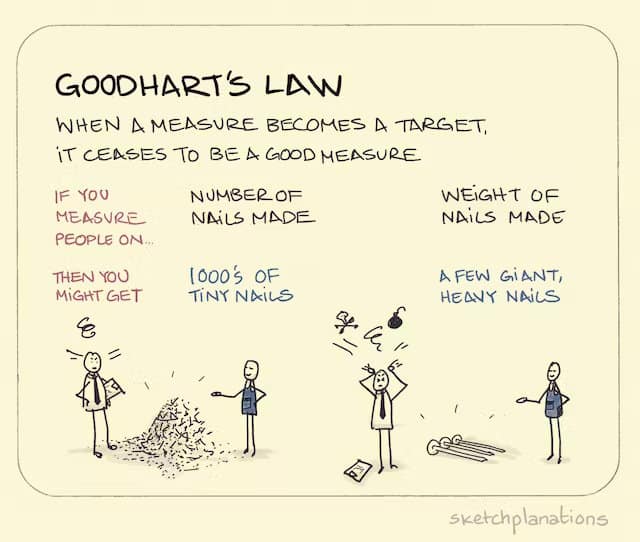“Keeping score” can make a big difference. Growing up, if my friends and were shooting hoops it’d generally be casual and fun, just tossing the ball around and chatting. However, as soon as it became a game of any kind, everything changed. It was still fun, whether it was 2-on-2 or “HORSE” or anything else, but keeping score completely changed the environment.
The same applies to business, and this can be a good or a bad thing. As I’ve shared before, when people starting measuring targets, they often cease to be valuable measurements because the approach is different. The site sketchplanations has a great example, seen below.
Suppose your business makes nails, and you want to track the work more closely to encourage more output.
- You could perhaps track the number of nails made, but that could lead to people making a ton of tiny nails.
- Or, you could track the total weight of the nails made, but that could lead to people just making a few huge nails.

There are certainly wants to help curtail those options, such as requiring all nails to be a precise size, but people will often just find the fastest way to meet a measure rather than adhering to the purpose behind it.
Without a score, you’re just practicing
That said, it can go the other way. In his book “The 4 Disciplines of Execution“, the authors share thoughts along this line. In particular, they say:
“If you’re not keeping score, you’re just practicing.”
Using the nail example above, simply not counting the nails would be very unwise. If that’s your business, you need to be keeping score to some degree to know how you’re performing. You may not be able to choose perfect incentives for your staff, but you still need to know how many nails are being shipped out each day if you want to be able to improve.
As we’re working to tighten up our EOS/Traction model at GreenMellen, a big piece we’ll be working on is our “scorecard”. If you’re familiar with that term in the area of EOS, it’s simply a list of things to measure in your business to know if things are on track or not. For many businesses, the list could include things like “sales meetings last week”, “number of widgets sold”, “value of open invoices”, “bank balance” and many more.
It’s hugely valuable to keep score, as long as you find a way to make sure that targets you’re tracking can’t be skewing by misaligned incentives for your team.



